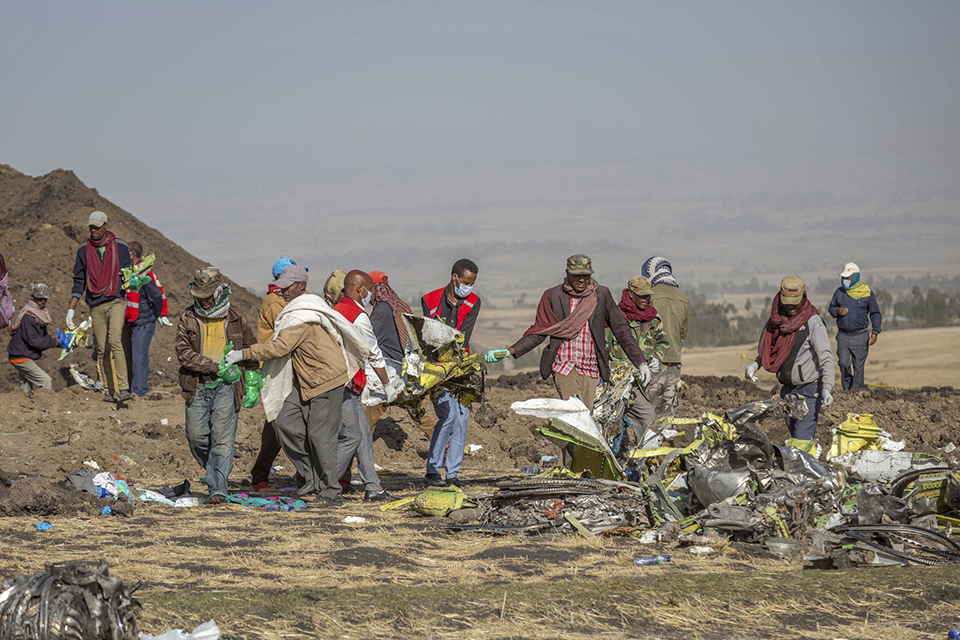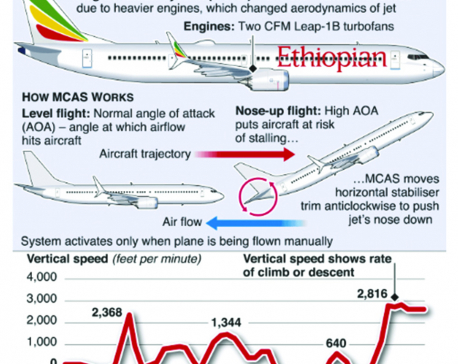
OR
Preliminary report: Ethiopia crew followed Boeing procedures
Published On: April 4, 2019 06:28 PM NPT By: Associated Press

ADDIS ABABA, April 4: The pilots of a doomed Ethiopian Airlines jet followed all of Boeing’s recommended procedures when the plane started to nose-dive but still couldn’t save it, according to a preliminary report released Thursday by the Ethiopian government. The plane crashed just six minutes after takeoff, killing all 157 people on board.
The report, based on flight data and cockpit voice recorders on the Boeing 737 Max 8, was not released in full. Boeing declined to comment pending its review of the report.
The Max 8 has been under scrutiny since a Lion Air flight crashed off the coast of Indonesia under similar circumstances in October. Thursday’s revelations raise questions about repeated assertions by Boeing and U.S. regulators that pilots could regain control in some emergencies by following steps that include turning off an anti-stall system designed specifically for the Max, known by its acronym, MCAS.
Investigators are looking into the role of MCAS, which under some circumstances can automatically lower the plane’s nose to prevent an aerodynamic stall. The Max has been grounded worldwide pending a software fix that Boeing is rolling out, which still needs to be approved by the U.S. Federal Aviation Administration and other regulators.
The Ethiopian Airlines jet crashed just after taking off from Addis Ababa on March 10.
Ethiopian investigators did not specifically mention the MCAS, but recommended that Boeing review “the aircraft flight control system related to the flight controllability.” They also recommended that aviation officials verify that issues have been adequately addressed before allowing the planes to fly again.
Boeing is the focus of investigations by the U.S. Justice Department, the Transportation Department’s inspector general, and congressional committees. Investigations are also looking at the role of the Federal Aviation Administration in the U.S., which certified the Max in 2017, declined to ground it after the first deadly crash in October. The agency was also reluctant to ground the planes after the Ethiopian Airlines crash and was among the last agencies to do so.
The FAA, which must certify the 737 Max is safe before it can go back into the air, said in a statement that the investigation is still in its early stages.
“As we learn more about the accident and findings become available, we will take appropriate action,” the agency said.
The statement did not say if the FAA would review Max’s flight control system as recommended by Ethiopian investigators, and FAA spokesman Greg Martin would not comment beyond the statement. Boeing is working on improvements to the MCAS software that would make it less aggressive in pointing the nose down and easier for pilots to disable. The FAA has said it will review the software before allowing the Max to fly again.
You May Like This

UML leader Basnet to Balen: Don't be pampered just because you have a few hundred fans on Facebook
KATHMANDU, August 26: While the Mayor of Kathmandu Metropolitan City (KMC), Balendra Shah, is speeding up the work to demolish... Read More...

Infographics: China grounds Boeing 737 MAX 8 jets
An Ethiopian Airlines Boeing 737 MAX 8 flight to Nairobi that crashed on Sunday with 151 passengers and eight crew... Read More...

Update: Five out of seven confirmed dead in helicopter crash in Taplejung
KATHMANDU, Feb 27: Five out of seven onboard confirmed dead in helicopter crash in Taplejung district on Wednesday afternoon. ... Read More...




Just In
- Rainbow tourism int'l conference kicks off
- Over 200,000 devotees throng Maha Kumbha Mela at Barahakshetra
- Indians vote in the first phase of the world’s largest election as Modi seeks a third term
- Kushal Dixit selected for London Marathon
- Nepal faces Hong Kong today for ACC Emerging Teams Asia Cup
- 286 new industries registered in Nepal in first nine months of current FY, attracting Rs 165 billion investment
- UML's National Convention Representatives Council meeting today
- Gandaki Province CM assigns ministerial portfolios to Hari Bahadur Chuman and Deepak Manange





_20220508065243.jpg)









Leave A Comment